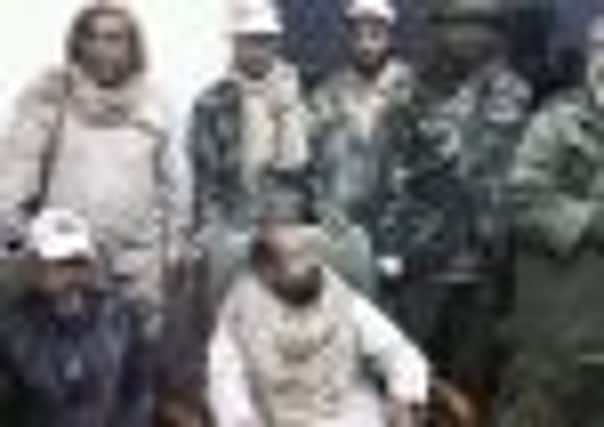Libya’s brutal security chief follows Saif into captivity


Senussi played a prime role in attempting to put down the rebellion against Muammar al-Gaddafi – but he had already built up a reputation as the brutal enforcer of Gaddafi’s will when he was the chief of internal security during a deadly purge of opponents in the early 1980s.
Many Libyans held Senussi responsible for the 1996 killing of some 1,200 inmates at Abu Salim prison in Tripoli.
Advertisement
Hide AdAdvertisement
Hide AdThe news of his capture came as Libyans in the dusty market town of Zintan were still digesting the arrival there of Saif al-Islam Gaddafi, the most prominent son of the former dictator.
Saif is being kept in a private house on the outskirts of this little town set in the rolling foothills of the Nafusa mountains, 100 miles south-west of Tripoli.
The rebel commander of the Zintan unit who captured him, apparently while he was trying to flee to Niger on Friday, yesterday said Saif had tried to escape arrest with the improbable declaration that he was a “camel keeper”.
“He said: ‘My name is Abdul Salem, a camel keeper,” said Ahmed Amur, a barrel-chested, grey-bearded commander still clad in the green camouflage jacket he was wearing when Saif was apprehended.
Saif’s deception was unlikely to work, given that his two-car convoy had just been intercepted and blocked by rebel jeeps tipped off about the suspect’s break for the border. “It was a VIP target, we did not know who,” said Mr Amur, who swapped his job as a professor of marine biology in February to become one of Zintan’s most effective commanders.
Saif also tried a second ruse, jumping from his jeep and throwing himself into the sand, emerging with a dirt-caked face he clearly hoped would add to his camel-keeping disguise.
The fact that he now languishes in Zintan and not in Tripoli, says much about the fractured state of post-war Libya and about the continuing role played by tribal politics.
The Nafusa rebels were, along with their comrades in Misrata, the most effective fighting formations of the seven-month war, and paid a high price in casualties. Zintan’s units advancing from the west and Misrata’s from the east captured Tripoli.
Advertisement
Hide AdAdvertisement
Hide AdWith Misrata getting the honour of capturing – and apparently executing – Col Gaddafi, Zintanis were keen to get a trophy of their own.
That trophy, in the shape of the dictator’s former son, duly arrived because the National Transitional Council (NTC) has no army of its own and relies on militia units, with their own particular tribal affiliations, for security.
Thus Zintani units were on patrol on the border, 800 miles to the south, when the chance came for an arrest.
Saif and Senussi are both wanted by the International Criminal Court in The Hague for war crimes and crimes against humanity, but Zintanis are keen that Gaddafi’s son is not only tried in Libya, rather than overseas, but that this trial take place in Zintan itself.
“We captured him, so I think we have the right to try him,” said the town council president, Dr Omran Eturki, who gained his PhD in engineering last year at Leicester’s De Montfort University.
“The judicial authorities can appoint the judges and the lawyers, but the trial must be here.”
The NTC, which is due to approve a cabinet this week, may disagree, but it is in little shape to object, not least because Zintan has kept a powerful army in the field.
The government is facing its own problems in declaring Saif will be tried in Libya rather than The Hague: The ICC says it has no problem with this, providing the Libyan justice system is up to the task.
Advertisement
Hide AdAdvertisement
Hide AdMany international lawyers remember the circus that was Iraq’s trial of Saddam Hussein, and fear justice will not be served unless a properly constituted court system can be formed.
Saif himself is surprisingly cheerful in captivity, given that a Libyan trial means an almost certain death sentence, with Zintan’s Ukrainian surgeon, Dr Andre Morokovsky, reporting that he is fit and in good spirits, despite missing most of the thumb and forefinger of his right hand.
A video made by Saif’s captors a showed the dictator’s son saying he was injured in a Nato air strike near Wadi Zamzam, about 90 miles south-east of Tripoli.
“He’s very nice,” said the doctor of the man accused of responsibilty for the torture, murder, bombardment and terror inflicted on thousands of Libyans. “He’s not down, he’s not scared.”
Zintan’s courthouse is a ruin and the town has no hotel, which may not make it the ideal place to hold an international war crimes trial, the conduct of which will affect how the outside world thinks of Libya for years to come.
But Zintanis, having seen off Gaddafi’s tanks with little more than raw courage, are optimistic. “I can assure you that Zintan is safe and secure enough [for a trial],” Osama Jewli, head of Misrata’s Military Council, told The Scotsman.
“Definitely I would like to see the trial here, we want to show the world that we believe in justice. If it is a fair trial I will accept the verdict, even if it means Saif walks free.”
From another man’s lips, in a town that had not fought and suffered as Zintan has, that might seem an idle boast. But from Mr Jewli, I am inclined to believe he means it.